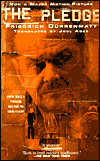
It Happened
in History!
(Go to
It Happened in History Archives)
|
Dürrenmatt believed that pure tragedy is impossible to achieve in an age and time when clear definitions of good and evil no longer exist. As an alternative, he suggested that "we can achieve the tragic out of comedy." So, through the use of the Brechtian technique, he set about crafting his plays so that both actors and audience maintained a distance to both the play's plot and characters. But Dürrenmatt strayed from Brecht, who believed in reason and change, by crafting his plays to show the pessimism that exists in modern society.
Dürrenmatt was born to a Protestant minister in Konolfingen, Switzerland. His family moved to Berne when his father became chaplain at Salem Hospital in 1935. Six years later, Dürrenmatt enrolled in the University, where he studied literature and philosophy. He also spent time painting, drawing, and reading a wide variety of tragedies, from Aristophanes to Kafka, Kierkegaard, and Ernst Jünger, all of whom influenced the Swiss writer greatly. After studying art at the University of Zurich in 1942-43, Dürrenmatt returned to Berne to devote his life to writing. His first play, Es steht geschrieben, premiered in Zurich in April 1947. It was about the suppression of a religious group, the Anabaptists, in Münster in 16th-century Germany. Der Blinde (1948) failed at the box office, but Romulus the Great (1949) was an international success. In it, the last Roman emperor allows his empire to perish in order to save humanity.
According to Dürrenmatt, Friedrich Schiller's idea of the tragic had become unworkable because it presupposes a clear concept of the world. But, in the nuclear age, "we can be reached only by comedy" behind which the tragic slowly exposes itself. In 1952, Dürrenmatt moved to Neuchâtel, and in 1968, he was named co-director of the Basel Theatre. The following year, he became a freelance artistic adviser at the Zurich Schauspielhaus. From 1968 to 1971, he co-edited the Züricher Sonntags-Journal. Dürrenmatt received numerous awards throughout his lifetime, including The Schiller Prize (1959), the New York Drama Critics Circle awards for The Visit, the Austrian State Prize (1984), the Büchner Prize (1986), and honorary degrees from five universities. He made his international breakthrough as a playwright with The Marriage of Mr. Mississippi (1952), produced in New York under the title, Fools are Passing Through, starring Alfred Lunt and Lynn Fontanne. In the comedy, Florestan Mississippi, a public prosecutor who has murdered his wife, marries Anastasia, who has murdered her husband. In their missionary zeal, they start to produce death sentences, failing because "everything can be changed, except man." Mississippi eventually dies after drinking poisoned coffee intended for Anastasia's lover, and Anastasia dies of coffee poisoned by her husband.
In his own detective novels, as in his plays, Dürrenmatt examines the questions of guilt, responsibility, and redemption. In The Pledge, which begins as a lecture and a travel story, he writes: "You don't try to get mixed up with the kind of reality that is always slipping through our fingers. Instead you set up a world that you can manage. That world may be perfect - who knows? - but it's also a lie."
From the mid-1970s, Dürrenmatt grew increasingly disenchanted with the stage and concentrated on prose experiments and essays. In many essays, he examines political issues. Israels Lebensrecht (1967) took Israel's side in the Six-Day War, and Tschechoslowakei 1968 condemned the Soviet suppression of the Prague Spring. Über Toleranz from 1977 was a plea for political tolerance. Dürrenmatt strongly objected to all totalitarian ideologies, from Communism to Nazism. Friedrich Dürrenmatt died of heart failure in Neuchâtel on December 14, 1990. Discover Friedrich Dürrenmatt
Indulge
Yourself - Check Out Today's Best-Selling |
- HOME -



 "The trouble is that in all these mystery stories an altogether
different kind of fraud is perpetrated. I am not even referring to the
fact that the criminal has his punishment meter out to him. Such pretty
fairy-tales are morally necessary too, I suppose. They are in the same
class with the other lies that help preserve the State, like that pious
phrase that crime doe not pay, whereas anyone has only to look at human
society to find out how much truth there is in that... No, what really
annoys me is the plot in your novels. Here the fraud becomes too raw and
shameless. You built your plots up logically, like a chess game; here the
criminal, here the victim, here the accomplice, here the master mind. The
detective need only know the rules and play the game over, and he has the
criminal trapped, has won a victory for justice. This fiction infuriates
me. Reality can be only partially attacked by logic" - from The Pledge,
1958
"The trouble is that in all these mystery stories an altogether
different kind of fraud is perpetrated. I am not even referring to the
fact that the criminal has his punishment meter out to him. Such pretty
fairy-tales are morally necessary too, I suppose. They are in the same
class with the other lies that help preserve the State, like that pious
phrase that crime doe not pay, whereas anyone has only to look at human
society to find out how much truth there is in that... No, what really
annoys me is the plot in your novels. Here the fraud becomes too raw and
shameless. You built your plots up logically, like a chess game; here the
criminal, here the victim, here the accomplice, here the master mind. The
detective need only know the rules and play the game over, and he has the
criminal trapped, has won a victory for justice. This fiction infuriates
me. Reality can be only partially attacked by logic" - from The Pledge,
1958
